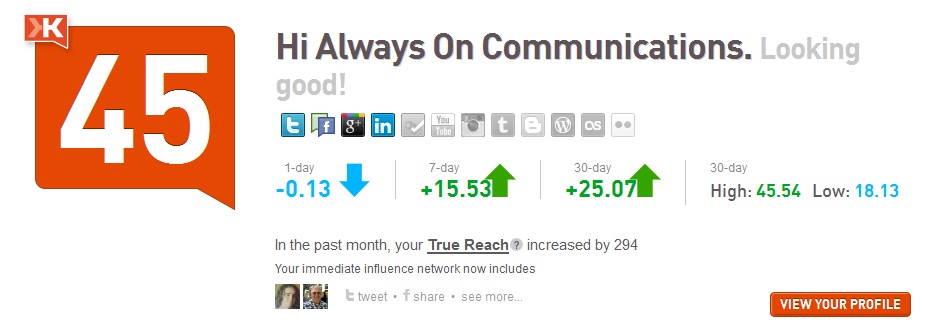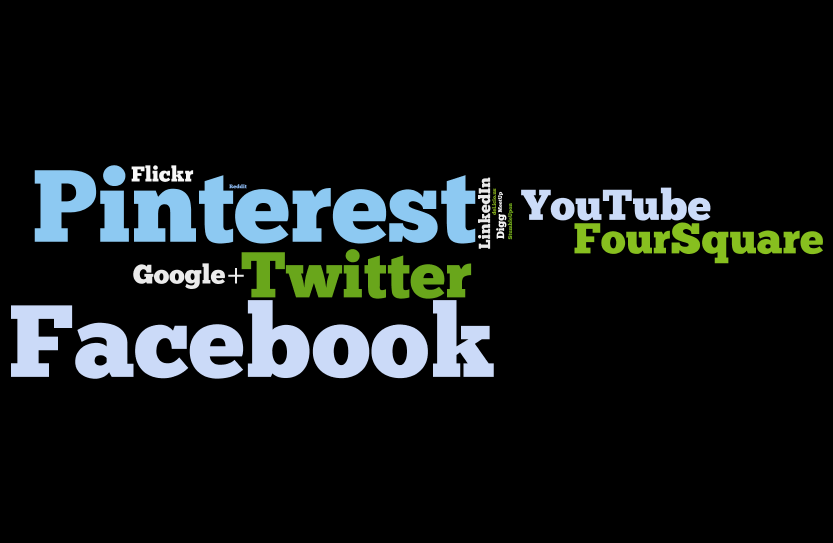Are you using Klout? Based on the profiles of our readership, we suspect that many of you actually aren’t. The question is – is that a good thing, or a bad thing? The jury is still out on this question.
Firstly, what exactly is “Klout?” According to their website,
The Klout Score measures influence based on your ability to drive action. Every time you create content or engage you influence others. The Klout Score uses data from social networks in order to measure:
- True Reach: How many people you influence
- Amplification: How much you influence them
- Network Impact: The influence of your network
Klout purports to take all of your social media networks and create a score of how influential you are with social media, and then compare yourself to other people online to see if you are more or less influential than they are.
Many people are skeptical about this process, and we are among them. However, let’s start by looking at the positive side of Klout and some of its supporters.
Nearly a year ago, social media personality Trey Pennington wrote an article entitled “Klout is Necessary.” In his article, Mr. Pennington listed three main reasons why he felt Klout is necessary:
1) Too much confusion (companies want to do social media correctly but there’s too much happening that it’s difficult to know where to start)
2) Too many voices (Klout helps companies sort through the nearly limitless number of voices that might be talking to them so they can concentrate on the more important ones)
3) Too much complexity (the social media landscape is far from settled, so Klout helps companies by creating a “standard” by developing a two-digit number that companies can understand and be comfortable with)
Those are all lofty goals and would seem to be excellent reasons for using Klout. We signed up with Klout for many of these reasons above, but our main reason for getting a Klout score was because, somehow, having Klout has not just become necessary, but as Jim Dougherty over at Leaders West noted just this past December, it’s a necessary evil. Klout, for better or worse, has become the standard of influence online.
Jim deals with one of the main problems we have with Klout – that it’s “tantamount to an ego trip.” While all social media involves a sort of mild bragging, Klout’s model exists to put weight behind the bragging. Someone we know has even told us that she’s proud that her Klout score is actually higher than the Klout score of the Director of Social Media at her office. It’s become a kind of contest at best, or even a form of old-school sandbox bullying. “My Klout score is better than yours!”
Rohn Jay Miller over at Social Media Today addresses this side of Klout head-on in his post “Delete Your Klout Profile Now!” He notes, “Measuring ‘social influence’ tries to sell the lie that such things as ‘social influence’ and ‘connected-ness’ can be measured quantitatively, then acquired, packaged and sold to the highest bidder.” He goes on to say, “What happens a year from now when you try to get a job in marketing and you’re rejected because your Klout score is only in the 30s? Or when a bunch of black hat rats figure out how to game the Klout system and make their small fortunes selling you robot apps that will juice up your Klout score?”
While it may sound like Miller is acting like a sore loser (was his Klout score really low, so he decided to delete it?), we don’t believe that’s the case.
We have noticed many inconsistencies with Klout’s scoring system, including very simple things such as:
- Not tracking Company Pages on LinkedIn (they only track personal pages)
- Not tracking Company Pages on Google+ (again, they only track personal Google+ profiles)
- The inability to track blogs that are hosted on a company’s own server (they can only track blogs that are hosted directly on WordPress or Blogger).
- Inconsistent scoring – our own Klout score went from 17 to 15 to 45 to 30 in the space of less than two weeks.
For now, we’re going to keep our Klout profile in the hopes that eventually Klout cleans up its scoring algorithms and because we do feel that there is a place for some kind of standard to help companies navigate the extremely complicated world of social media. Until something better comes along, it looks like we’re stuck with Klout, for better or worse.
Comments are closed.




